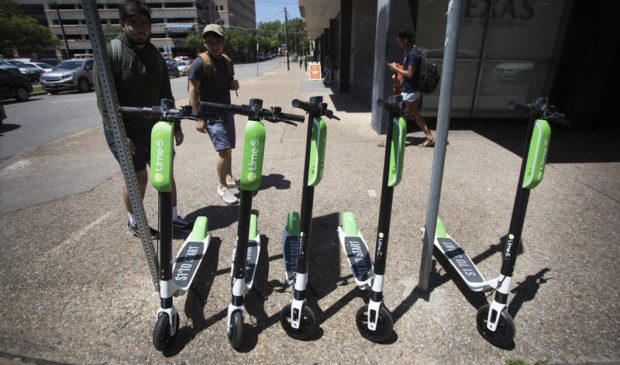Newsletter Signup
The Austin Monitor thanks its sponsors. Become one.
Most Popular Stories
- Austin-Bergstrom International Airport announces new flight service while anticipating capacity cuts
- Austin Resource Recovery to formally amend cart collection rules
- City facing a $33 million deficit for 2026
- Austin ISD gets $41 million from the Education Department. What happens if the agency closes?
- Staffing isn’t the only thing to blame for Austin’s slow 911 response times
-
Discover News By District

Are electric scooters eco-friendly? It depends on what they’re replacing
Monday, May 7, 2018 by Mose Buchele, KUT
When electric scooters flooded into Austin, the companies that rent them touted their environmental benefits: “Riders were able to prevent 445,334 pounds of carbon emissions,” a press release from Bird said. The startup LimeBike estimated its scooters reduced 8,500 pounds of CO2 here in just two weeks.
But those numbers are based on some shaky assumptions.
Sam Sadle, LimeBike’s director of strategic development, said his company assumes most scooter users are riding them instead of riding in cars. Bird said it assumes half its scooter rides are replacing a 1-mile car ride. So, are scooters replacing car trips?
“We honestly don’t know yet,” said Phil Lasley, who studies traffic, bicycle and pedestrian issues with the Texas A&M Transportation Institute.
He said it’s possible scooter rides are replacing short drives, but they could be replacing other modes of transportation, too.
“Are these trips taking away from other bicycle trips? Are they taking away from transit? Are they taking away from walking?” Lasley said. The technology is so new that people don’t know.
But that doesn’t stop people from making educated guesses.
Haje Jan Kamps published a piece last month on TechCrunch outlining the financial assumptions e-scooter companies need to make for their business models to succeed.
Kamps, the director of portfolio at the venture capital firm Bolt, said the startups are in a desperate fight to win riders. (He said the firm has no investment in any e-scooter companies.)
“They are currently in a massive scaling mode,” he said, “and so the only concern they have, really, is to get as many scooters on the roads as possible, and as many rides as possible for each individual scooter.”
Depending on how sturdy the scooters are and how often they’re thrown out and replaced, that could be bad news for the environment.
“So the way this pans out is the only thing you care about is growth at any cost,” Kamps said. “There is a real risk that some of the things like reusability or recyclability might be first on the chopping block.”
“Not so!” say scooter companies.
“I like to say that we use every part of the buffalo,” said Anthony Fleo, regional general manager for LimeBike in Austin. He said even when a scooter needs to be scrapped, its working parts are retained for use on other bikes and scooters.
Fleo estimated that LimeBike scooters have a two-year life span – but that depends on the use they get.
“It appears that these services are being heavily used,” Lasley said.
He said the more popular scooters become, the more they may end up in the waste stream, even if they reduce CO2 emissions.
And again, that’s if.
This story was produced as part of the Austin Monitor’s reporting partnership with KUT. Photo by Jorge Sanhueza-Lyon/KUT News.
The Austin Monitor’s work is made possible by donations from the community. Though our reporting covers donors from time to time, we are careful to keep business and editorial efforts separate while maintaining transparency. A complete list of donors is available here, and our code of ethics is explained here.
You're a community leader
And we’re honored you look to us for serious, in-depth news. You know a strong community needs local and dedicated watchdog reporting. We’re here for you and that won’t change. Now will you take the powerful next step and support our nonprofit news organization?





